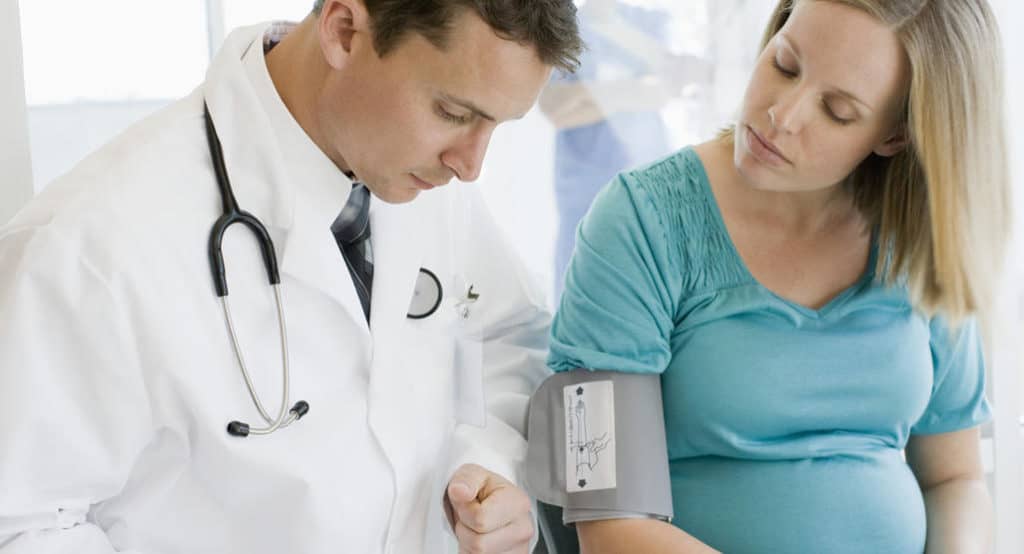
Table of Contents
In pregnancy, the risk for preeclampsia is quite common and is caused by high blood pressure and other signs of damage to other organ systems like the liver and kidneys. It usually begins in the postpartum weeks or generally after the 20 weeks of pregnancy. However, if the signs of preeclampsia are left unnoticed or left without treatment, it could lead to serious complications for both the baby and the mother.
In case you find these signs when you’re pregnant, the most effective treatment is to deliver the baby. But this doesn’t provide any guarantee of not staying post the delivery and will perhaps take some time to aid.
On the other hand, if you find symptoms of preeclampsia in the early trimester of your pregnancy which is of course too early for delivery, the healthcare provider and you will be in quite a challenging spot. This means you will now have to be very cautious with your health until the baby is mature and can be delivered. Preeclampsia in pregnant women is rarely developed post the delivery of a baby known as postpartum preeclampsia but has no guarantee of going away immediately.
To know more about the causes, symptoms, and precautions of preeclampsia, read on!
Symptoms of Preeclampsia Alongside
High Blood Pressure
Preeclampsia is a few cases that develop in the absence of any symptoms, however, there are a few things you can look for. One of these includes a sudden rise in blood pressure which is the most common and vital part of prenatal care. The pressure can exceed 140/90 millimeters of mercury (mm Hg) or even greater, on two occasions, four hours apart, which is abnormal.
The other signs and symptoms include:
- Excess protein in the urine (proteinuria) or any other sign of kidney problems
- Vomiting or nausea
- A sudden change in the vision, like temporary loss, blurred, or light sensitivity vision
- Headaches
- Pain in the upper abdominal, under the ribs on the right side
- Lowering of the platelets in the blood (thrombocytopenia)
- Less urine output
- Difficult breathing due fluid-filled lungs
- Impaired functioning of the liver
Edema or sudden weight gain is also a sign, but because it is common in pregnancies, it isn’t considered a reliable sign of preeclampsia.
Other Symptoms During Pregnancy Besides Blood Pressure
Preeclampsia is considered to be one of the four disorders caused by high blood pressure during pregnancy. The other three are:
- Gestational hypertension: Women with this disorder have high blood pressure, no excess protein in the urine, or any other signs of organ damage. Even then, sometimes these women end of developing preeclampsia.
- Chronic hypertension: This is a high blood pressure disorder that is present before the pregnancy or develops that occurs 20 weeks before pregnancy. However, it is hard to determine as high blood pressure usually doesn’t have any symptoms.
- Chronic hypertension with Preeclampsia: This disorder develops in women who were diagnosed with chronic blood pressure pre-pregnancy. This develops, worsening the high blood pressure and protein in the urine or even various other health complications in pregnancy.
Causes of preeclampsia
Several factors involve the cause of preeclampsia, and experts believe that it begins in the placenta (the organ that nourishes the fetus). In the early stages of pregnancy, the new blood vessels develop to efficiently send blood to the placenta.
Thus, women with preeclampsia do not develop the blood vessels or fail to function properly as they are narrower compared to normal blood vessels. It reacts differently to hormonal signaling, limiting the amount of blood flow.
Here are the causes of this abnormal development:
- There is insufficient blood flow to the uterus
- Damage to the blood vessels
- Causes trouble in the immune system
Risks of Preeclampsia
Here are the cases where you might have the risk of Preeclampsia during pregnancy:
- You have had a history of Preeclampsia: If you have a history of preeclampsia in your personal or family history, there is a risk of you getting it.
- Facing chronic hypertension: There is a higher chance in women who have chronic hypertension.
- First pregnancy: A first pregnancy has the highest chance of developing preeclampsia.
- Different paternity: In case each pregnancy has a new partner, the chances of getting diagnosed with preeclampsia are high as compared to the second or third pregnancy with the same partner.
- Your age: The risk of preeclampsia is higher in women who are younger or older than 35.
- Ethnicity: As per the studies of the American Heart Association in Boston, preeclampsia happens to affect black women more compared to women of other races. This results due to racial disbalance and health conditions.
- Obesity: Women with obesity have a higher risk of preeclampsia.
- Multiple pregnancies: There could be a risk of preeclampsia if you are carrying twins, triplets, or other multiples.
- If there are intervals between pregnancies: If you are having babies in less than two years or within a gap of more than 10 years, there is a higher risk of preeclampsia.
- A history of certain conditions: Conditions like migraines, chronic high blood pressure, type 1 or type 2 diabetes, blood clot development, kidney disease, or lupus before your pregnancy increase the risk of preeclampsia.
- In vitro fertilization: If you have conceived via in vitro fertilization, there are chances of getting diagnosed with preeclampsia.
Complications of Preeclampsia
There are no clear strategies to prevent preeclampsia in pregnant women, but there are a few things you could follow. These include:
- Low-doses of aspirin: If in your pregnancy you tend to meet most of the risk factors, like having a history of preeclampsia, multiple pregnancy, chronic high blood pressure, kidney disease, or diabetes, the doctor would recommend a daily low-dose aspirin (81 milligrams) to begin after 12 weeks of pregnancy.
- Calcium supplements: In most populations, women with calcium deficiency before their pregnancy, and those who lack calcium during pregnancy, benefit from taking calcium supplements. This in turn helps in preventing preeclampsia. However, it could be unlikely for women from developed countries to have calcium deficiency to such a degree that they cannot go without calcium supplements.
How to prevent Preeclampsia?
There are no clear strategies to prevent preeclampsia in pregnant women, but there are a few things you could follow. These include:
- Low-doses of aspirin
If in your pregnancy you tend to meet most of the risk factors, like having a history of preeclampsia, multiple pregnancy, chronic high blood pressure, kidney disease, or diabetes, the doctor would recommend a daily low-dose aspirin (81 milligrams) to begin after 12 weeks of pregnancy.
- Calcium supplements
In most populations, women with calcium deficiency prior to their pregnancy, and those who do not get enough calcium during pregnancy via their diets, benefit from calcium supplements to prevent preeclampsia. However, it could be unlikely for women from the US or other developed countries to have calcium deficiency to a degree where the calcium supplements would benefit them.
Note – Do not have any medications or vitamin supplements without consulting or talking to your doctor. Also, before you’re pregnant, especially in cases where you’ve had preeclampsia before, it’s a good idea to be as healthy as you can, lose weight if needed, and manage certain conditions like diabetes to avoid and prevent health hazards during your pregnancy.
When pregnant, take extra care of yourself and the baby via early and regular prenatal care. And, in case you have preeclampsia detected in your early pregnancy, do not overstress yourself. The doctor may follow a few tests to prevent any complications.
When Must You See a Healthcare Provider?
There are no chances or choices given in cases of preeclampsia, you must make sure to attend all prenatal visits to prevent any pregnancy complications. In case you experience severe headaches, blurred vision, abdomen pain, or shortness of breath, visit the doctor immediately.
This is to prevent any health of the baby, as headaches, nausea, and aches are common pregnancy complaints, which makes it difficult to decipher if it indicates preeclampsia or is simply a part of pregnancy, especially in the first pregnancy. Also, if there are any other symptoms and you are concerned, contact your doctor.
To Conclude:
Preeclampsia is quite a common symptom seen in pregnant women and is perhaps curable. However, due to the commonality of the signs they could be mistaken to be a common pregnancy symptoms that could lead to becoming problematic and cause severe pregnancy complications.
Therefore, it is very important to know and help prevent preeclampsia when diagnosed in regular health checkups. Stay healthy, stay safe!
Preeclampsia FAQs:
1) How can you reduce the risk of preeclampsia naturally?
2) When to be worried about preeclampsia?
3) What is the best treatment for preeclampsia?
Sources:
Reviewed By:

Esha Chainani - Obstetrician and Gynaecologist
Dr. Esha Chainani is an Obstetrician, Gynaecologist, and laparoscopic surgeon who aims to break the stigma around women’s health by advocating an inclusive and open practice of obstetrics and gynecology and an author of several internationally published research papers and health articles in the media like the Swaddle.
She also founded Premaa, a non-profit to reduce maternal morbidity and eventual maternal mortality by providing lower-income pregnant women living in urban areas with cell phone access through an app that can feature an entire section about contraception as well for a whole gamut of reproductive health.
A panel for multiple health sessions including with the UN, USAID, BMC, gender at work, and multiple non-profit organisations, and is on the advisory panel of the South Indian medical students association.









